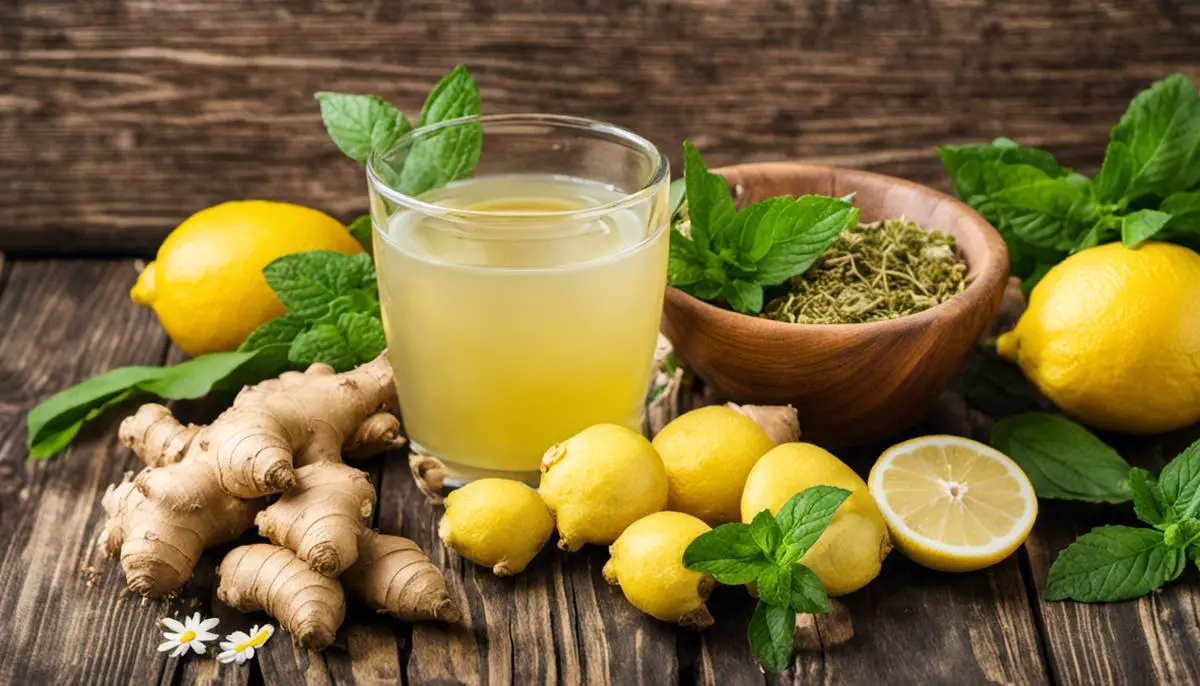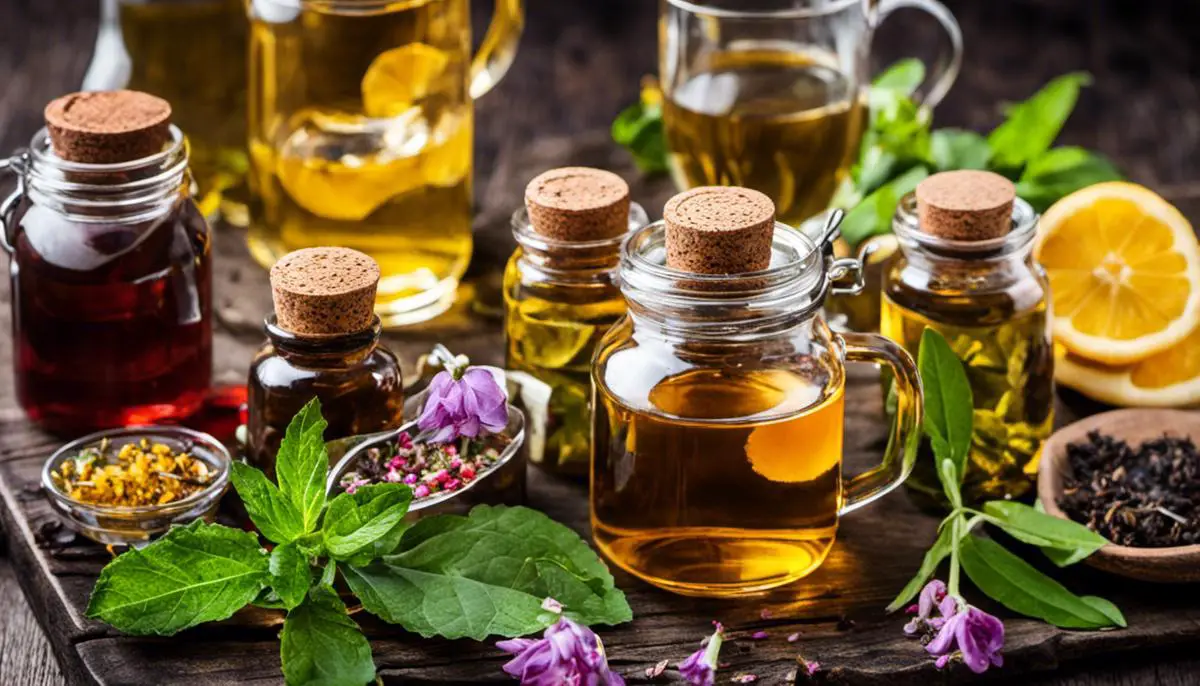Bloating is a common digestive issue that seems mundane yet can be quite disruptive in daily routine. More than just a feeling of fullness, bloating refers to a feeling of pressure, discomfort or swelling in your abdomen. This can occur due to various reasons including overeating, food intolerances, hormonal fluctuations or even due to certain digestive disorders. With an array of impactful symptoms and causes, understanding bloating is paramount to finding relief.
You may have pondered whether visiting a doctor is necessary to treat such an issue. Little did we know, the answer often lies right within our homes in the form of easy, effective home remedies. Home remedies prove to be advantageous due to their cost-effectiveness, high accessibility and lower side effects compared to conventional medications. But what remedies are out there, how they work, how to use them, and how to avoid bloating in the first place, are all questions we will progressively answer as we delve deeper into the holistic approach of managing bloating.
Understanding Bloating
Understanding Bloating: An Overview
Bloating refers to the sensation of fullness or swelling in the abdominal area. The condition often results in discomfort, sometimes accompanied by a visible increase in the stomach size. While bloating can sometimes be a symptom of a severe medical condition, it is also a common occurrence that everyone experiences at some point. Bloating could be the result of overeating, food intolerances, hormonal fluctuations, foods that produce gas, or other health concerns such as constipation, gastrointestinal issues, or irritable bowel syndrome.
Common Causes of Bloating
Several factors can cause bloating, and one of the most common is overeating. When you consume food in large quantities, your stomach stretches to accommodate the food, leading to a bloated feeling. Certain types of foods are more likely to cause bloating due to their composition. These typically include beans, lentils, broccoli, cabbage, onions, and carbonated drinks, notorious for producing gas in the digestive system.
Food intolerances or sensitivities, such as lactose or gluten intolerance, could also cause bloating. People with these intolerances are unable to fully digest certain components of food, resulting in gas production and bloating. Hormonal fluctuations during menstrual cycles can also lead to bloating in women, accounting for water retention and an overall sensation of puffiness.
Bloating Symptoms and Impact on Daily Life
Bloating is often characterized by a feeling of discomfort or tightness in the abdominal area. There may be visible distention or swelling of the stomach. Sometimes bloating is accompanied by other symptoms like abdominal pain or discomfort, gas, frequent burping or belching, and occasionally, shortness of breath. Bloating could potentially impact daily life by causing discomfort and inconvenience. Persistent or recurrent severe bloating could potentially indicate more severe medical conditions, and it is recommended to seek medical attention if these symptoms persist.
Combatting Bloating at Home
Bloating can often be managed right from the comfort of your home with a variety of cost-effective remedies. Consistent hydration, a diet low in gas-producing foods, regulated meal patterns, and eating at a moderate pace can help prevent bloating. Peppermint tea, well-known for its antispasmodic properties, is an easy and popular choice for relieving bloating, as it aids in relaxing the digestive tract muscles.
Physical activity is another excellent method to mitigate bloating, promoting the swift passage of gas through the digestive system. Probiotics, which are found in certain yogurts or in supplementary forms, can enhance gut health and minimize bloating, particularly for individuals with irritable bowel syndrome or similar digestive conditions.
Carminative fennel seeds, often consumed after meals, can help expel gas from the digestive system, effectively reducing bloating and resulting discomfort. While these methods can prove beneficial for many, it is absolutely essential that you consult a healthcare professional in case of persistent bloating or significant discomfort.

Photo by towfiqu999999 on Unsplash
Why Home Remedies?
Benefits of Home Remedies for Bloating
The appeal of using in-home methods for bloating relief mainly stems from their practical and cost-effective qualities in contrast to traditional treatments. Home remedies usually require entities that are commonly found in your kitchen or can be easily purchased at local stores, making them a much more affordable alternative to over-the-counter medical treatments.
For example, brewing a hot cup of ginger tea at home can help combat bloating without costing an arm and a leg. In comparison, continuous purchases of anti-gas or antacid medications can burn a hole in your pocket while also not being readily available at your discretion. Besides, store-bought medicines may not be suitable for everyone, particularly for those with certain medical conditions or on different medications.
The convenience factor also lends to the allure of such remedies, allowing you to address common symptoms like bloating, usually experienced post heavy meals or consumption of certain foods, without the need to make an emergency pharmacy visit. Readily available ingredients like ginger, peppermint, lemon, and chamomile can also be conveniently used.
Home remedies also tend to have fewer side effects compared to synthetic drugs – a significant point in their favor. Over-the-counter treatments could lead to unpleasant reactions in some individuals or carry unwarranted secondary effects. Home treatments, made from natural ingredients, are less likely to have these adverse effects. However, it’s paramount to consider that individual body responses to both food and medication can vary greatly, so what might work effortlessly for one could be ineffective for another.
Evaluating the Success of Home Remedies for Bloating
While home remedies may not have been as thoroughly examined as pharmaceutical medications, some studies propose their potential effectiveness. For instance, a study conducted in 2014 and published in the Journal of Clinical Gastroenterology observed that peppermint oil could be a safe and short-term effective remedy for abdominal pain and discomfort due to Irritable Bowel Syndrome, often accompanied by severe bloating. However, this study recommends more exhaustive trials to fully verify these findings.
In a separate investigation from the European Journal of Medical Research, a combination of peppermint oil and caraway oil showed promising results in relieving symptoms of functional dyspepsia, a condition that causes upper abdominal discomfort and bloating. Similar to the previous study, the researchers called for more in-depth studies to compare the long-term effectiveness of these remedies with current medical treatments.
Despite these encouraging research findings, home remedies should be considered with a level of caution and should not replace professional medical advice. Always consult with healthcare professionals or dieticians before making substantial changes to your existing health management practices. Often, home remedies are most effective when used in conjunction with, not as a replacement for, medical treatments.

Home Remedies for Bloating
Food Choices to Minimize Bloating
Your diet plays an influential role in managing bloating. A high-fiber diet, for example, can support your digestive system, improve satiety, and assist in reducing bloating. Foods loaded with fiber include whole grains, fruits, vegetables, and legumes. Yet, it’s essential to gradually incorporate fiber into your diet as an abrupt increase can cause gas and bloating.
Restricting consumption of foods that trigger gas like beans, broccoli, cabbage, onions, and carbonated drinks can also be beneficial. Although salty foods do not directly cause gas, they stimulate water retention in the body, which can lead to bloating. Monitoring your portion sizes is equally important. Overeating is a primary cause of bloating – consuming smaller, regular meals can help alleviate this.
Hydration May Help
Keeping yourself adequately hydrated can mitigate bloating and provide considerable digestive benefits. Water can aid the breakdown of food in your system, reducing the chances of experiencing bloating or gas. However, avoid drinking your water during meals, as this could interfere with stomach acid, slowing digestion, thereby causing bloating.
Probiotics: Beneficial for Gut Health
There is a growing body of research suggesting that probiotics – the ‘good’ bacteria found in certain foods and supplements – can help manage bloating. Probiotics aid digestion by altering the gut flora to a healthier mix. You can consume probiotics in fermented foods, such as yogurt, kimchi, and kefir, or as a dietary supplement.
Exercise Your Way to Reduced Bloating
Regular physical activity can aid in maintaining a healthy digestive system and lessening bloating. Walking, running, biking, or any form of cardio helps the body process food and reduce gas. Additionally, specific yoga poses like the child’s pose or the supine twist can provide immediate relief from discomfort due to bloating.
Herbal Teas to Tame Bloating
Certain herbal teas are well-known for their ability to soothe a bloated stomach. Peppermint tea has antispasmodic properties that can relax the muscles of the gastrointestinal tract, while ginger tea could speed up stomach emptying, curbing the likelihood of bloating. Meanwhile, chamomile tea may reduce the inflammation in the stomach, indirectly reducing bloating.
Alternative Remedies
A variety of natural, alternative remedies may help with bloating, including essential oils. For instance, peppermint essential oil can relax your digestive muscles and diminish bloating. Warm compresses applied to your stomach can also ease discomfort from gas buildup. Just as ginger and peppermint teas can assist, consuming fresh ginger or mint may provide similar benefits.
Caution in Self-Treating Bloating
While these home remedies can often reduce or eliminate bloating, it’s critical to remember that recurring or severe bloating could be a symptom of an underlying medical condition. Conditions such as IBS, food intolerances, hormonal fluctuations, and more serious digestive diseases can cause persistent bloating. If you’re experiencing prolonged or repeated episodes of bloating, it’s important to consult with a healthcare provider to rule out any potential medical conditions.
It’s essential to bear in mind that the efficacy of home remedies for bloating can vary greatly among individuals. This variation often depends on factors such as genetics, diet, and overall health conditions. Consequently, it’s crucial to determine what remedies suit you best by experimenting with different ones and maintaining a balanced lifestyle along the way.

Preventing Bloating
Getting a Grip on Bloating and What Causes It
Bloating typically stems from an overproduction of gas or disruptions in the movement of the digestive system’s muscles. It often manifests as discomforting sensations, such as pain and a ‘full’ feeling. Certain foods, including lentils, Brussels sprouts, broccoli, cabbage, onions, and fizzy drinks, frequently trigger bloating. Likewise, overeating, rapid eating pace, smoking, and constipation can lead to a bloated feeling. Bloating tends to be a common complaint among those with functional gastrointestinal disorders like irritable bowel syndrome (IBS).
Dietary Changes for Preventing Bloating
The first step in preventing bloating is to make dietary changes. It’s recommended to monitor the effects of certain foods on your digestive system and eliminate those that cause discomfort. Reduce the intake of gas-causing foods, such as beans, lentils, broccoli, cabbage, onions, and carbonated drinks. Processed foods are also known to cause bloating, hence try and opt for fresh foods.
Importance of Hydration
Dehydration can significantly contribute to bloating. When you’re not adequately hydrated, your body may retain water to prevent dehydration, leading to bloating. Drinking at least eight to ten cups of water per day is crucial for maintaining a healthy digestive system and preventing bloating.
Role of Exercise
Regular physical activity is essential to help your body and gas move through your digestive system effectively, reducing bloating. Walking or cycling for 30 minutes a day or doing yoga once daily can significantly help maintain your digestive health.
Stress Management for Bloating
There is a strong connection between stress levels and digestive health, so managing stress can be an effective way to reduce bloating. Techniques such as yoga, meditation, deep-breathing exercises, or any other stress-reducing activities can be beneficial.
Avoid Overeating and Eat Slowly
Eating too much at one meal can cause you to become bloated. Try eating smaller, more frequent meals throughout the day to prevent overloading your digestive system, which can result in gas and indigestion. Also, eat meals slowly. Eating quickly can cause you to swallow air, which can lead to bloating.
Use of Probiotics
Probiotics are known to provide multiple health benefits, including improved digestion. Probiotics keep the gut flora balanced, which can aid in reducing gas, bloating, and other digestive problems. Sources of probiotics include supplements or fermented foods like yogurt, kefir, kimchi, and sauerkraut.
Role of Peppermint Tea
Peppermint tea is known for its ability to soothe digestive issues and reduce bloating. It relaxes digestive muscles and increases the flow of bile, improving the digestion process. Enjoying a daily cup of peppermint tea might aid in maintaining a bloating-free life.
Implementing these changes to your lifestyle can potentially help prevent bloating. However, if bloating becomes a constant issue or is related to more severe symptoms, seek the help of a medical professional immediately.

Photo by towfiqu999999 on Unsplash
A shift in our daily patterns, habits, and dietary choices can significantly prevent bloating. Lifestyle and dietary changes, hydration, stress management are potential gateways to maintaining a life free from bloating. With an array of natural remedies shared, right from dietary changes, specific foods, exercises, to herbal teas, it is indeed possible to manage this condition effectively at home.
Bloating needs not to be a lifelong companion impacting our general health and daily life. It’s time we become proactive in understanding and applying these home remedies, to not just alleviate the symptoms but to eliminate them from the root. Remember, each step towards a healthier lifestyle brings us a day closer to a bloating-free existence and a more harmonious relationship with our bodies.
